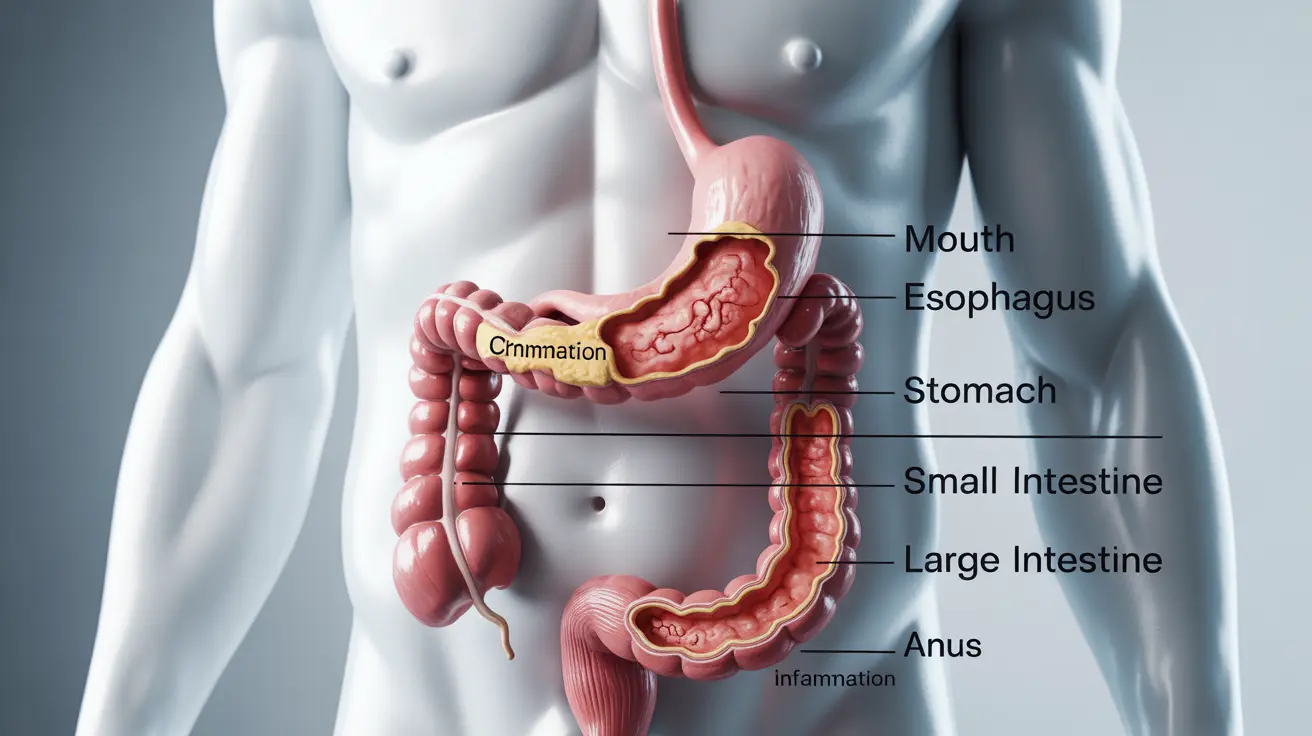Crohn's disease is a complex inflammatory bowel disease (IBD) that affects millions of people worldwide. This chronic condition causes inflammation in the digestive tract, leading to various symptoms that can significantly impact quality of life. Understanding its causes, symptoms, and treatment options is crucial for both patients and their caregivers.
While there is no cure for Crohn's disease, proper management and treatment can help control symptoms and prevent complications. This comprehensive guide will explore everything you need to know about this challenging condition.
Key Symptoms and Diagnosis
Crohn's disease can affect any part of the digestive tract, from mouth to anus, leading to various symptoms that may vary in severity among individuals. Common symptoms include:
- Persistent diarrhea
- Abdominal pain and cramping
- Fatigue
- Unintended weight loss
- Reduced appetite
- Blood in stool
Diagnosis typically involves a combination of medical tests and procedures, including:
- Blood tests to check for inflammation markers
- Stool tests
- Colonoscopy or endoscopy
- Imaging tests (CT scans, MRI)
- Tissue biopsies
Understanding the Causes
The exact cause of Crohn's disease remains unknown, but research suggests several contributing factors:
Genetic Factors
About 15% of people with Crohn's disease have a close relative with the condition. Scientists have identified specific gene variations that may increase susceptibility to developing the disease.
Immune System Response
Crohn's disease appears to involve an abnormal immune response where the body attacks healthy cells in the digestive tract, causing inflammation. This autoimmune component plays a crucial role in the disease's development and progression.
Treatment Approaches
Treatment for Crohn's disease typically involves a combination of approaches:
Medications
- Anti-inflammatory drugs
- Immune system suppressors
- Antibiotics
- Biologics
Surgical Options
When medications aren't effective or complications arise, surgery might be necessary. Common surgical procedures include strictureplasty, bowel resection, or removal of damaged portions of the digestive tract.
Lifestyle Management
Several lifestyle factors can influence Crohn's disease symptoms and overall management:
Diet Considerations
While there's no specific diet that works for everyone with Crohn's disease, many people find that certain dietary modifications help manage symptoms. Working with a registered dietitian can help develop an individualized eating plan.
Stress Management
Stress doesn't cause Crohn's disease, but it can worsen symptoms. Implementing stress-reduction techniques such as meditation, yoga, or regular exercise can be beneficial.
Preventing Complications
Regular medical check-ups and adherence to treatment plans are essential for preventing complications such as:
- Bowel obstruction
- Fistulas
- Malnutrition
- Increased risk of colon cancer
Frequently Asked Questions
- What are the most common symptoms of Crohn's disease and how is it diagnosed?
The most common symptoms include persistent diarrhea, abdominal pain, fatigue, and weight loss. Diagnosis involves a combination of blood tests, imaging studies, endoscopy, and tissue biopsies to confirm the condition and rule out other diseases.
- What causes Crohn's disease and how do genetics and the immune system contribute to it?
The exact cause is unknown, but genetic predisposition and immune system dysfunction play significant roles. People with family members who have Crohn's disease are more likely to develop it, and the condition involves an abnormal immune response that attacks healthy digestive tract tissue.
- How is Crohn's disease treated and what are the options to manage flare-ups?
Treatment typically includes medications like anti-inflammatories, immunosuppressants, and biologics. During flare-ups, additional medications, dietary modifications, and rest may be necessary. In some cases, surgery might be required to address complications.
- Can lifestyle factors like smoking, diet, or stress affect Crohn's disease symptoms or risk?
Yes, lifestyle factors can significantly impact symptoms. Smoking can worsen the condition and increase the risk of complications. Diet affects symptom severity, and stress can trigger flare-ups. Managing these factors is crucial for better disease control.
- What complications can arise from Crohn's disease and how can they be prevented or treated?
Common complications include bowel obstruction, fistulas, abscesses, and malnutrition. Prevention involves maintaining regular medical care, following prescribed treatments, and making appropriate lifestyle modifications. When complications occur, they may require specific medical interventions or surgery.




